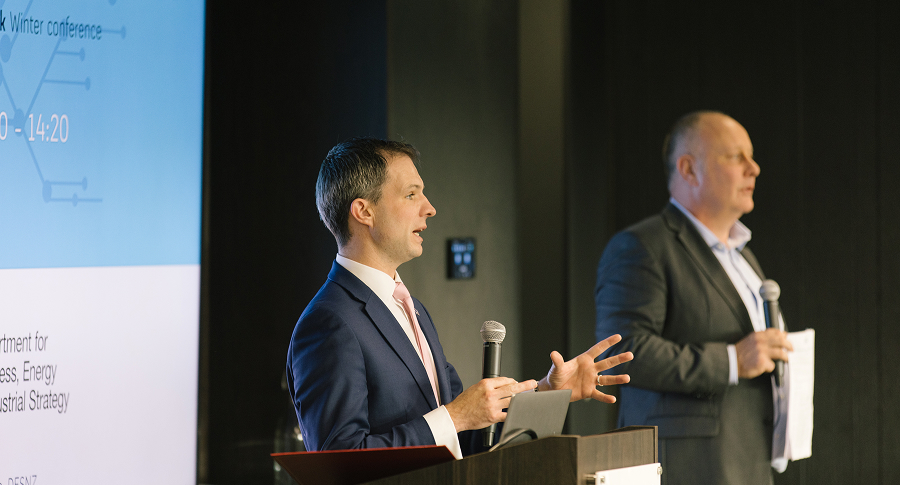Our ambitious paper, Energy Networks for the Future, highlights the need for a new partnership between the public and private sector to deliver the energy infrastructure needed to achieve net zero decarbonisation.

Our ambitious paper, Energy Networks for the Future, highlights the need for a new partnership between the public and private sector to deliver the energy infrastructure needed to achieve net zero decarbonisation.

We know the electricity networks have a critical role to play in our decarbonisation journey. This has been highlighted by the renewed political interest in who owns the networks, how they are governed and the method by which they are regulated and incentivised to make the right investments for our future. This paper, launched in November 2019 at the Merseyside Maritime Museum, is written by Regen and supported by SP Energy Networks. It examines whether the current regulatory model for electricity networks is still fit for purpose to lead the energy transformation and deliver the scale of investment needed to achieve net zero carbon. A core finding of the paper is that radical reform of the current regulatory model for the energy networks is needed to meet the climate emergency, and to ensure public trust that the industry can deliver a zero carbon energy system that is sustainable, resilient and affordable. The report also identifies reforms to the way in which networks are incentivised to make strategic investments in infrastructure and to support the development of new smarter energy solutions.
Our recommendations include:
The paper has been informed by in-depth research, including interviews with a wide range of industry leaders and stakeholders. Regen's expertise across the whole system and our strong relationships with Distribution Network Operators (DNO), devolved governments, local authorities and community groups, has given us a solid basis on which to investigate, analyse and design a new network model. Working closely with SP Energy Networks, we have been able to understand the ambitions and pressures on DNOs, as well as that of their customers, as we transition to a net zero energy system and society.

A debate has begun about the role that networks will play in the future of energy, and whether the current model is fit for purpose. One proposed approach is to renationalise the networks, to be directly financed and managed for the public good. At the other end of the policy spectrum there have been calls for radical deregulation and liberalisation of the energy sector. Either way, there is a significant execution gap between the UK’s ambitious decarbonisation targets and the energy strategy, policies and investment needed to deliver them.
The future network sketch shows a new national “energy agency” or “Office of Net Zero” with the political backing to drive net zero carbon delivery across government departments. This agency would work with national governments, cities and regions to develop and implement energy and decabonisation policy. Futhermore, regional energy governance bodies are essential to deliver the transformational change that is needed at a local level. An accelerated DSO transition is also needed, which could be achieved by expanding the DSO role to work with regional bodies to deliver wider energy system objectives, including decarbonisation at least cost.
"We know the electricity networks have a critical role to play in our decarbonisation journey, this has been highlighted by the renewed political interest in who owns the networks, how they are governed and the method by which they are regulated and incentivised to make the right investments for our future.
Ultimately however, the question of ownership may be less important than the ability of the public and private sectors to work together in a new partnership to deliver decarbonisation at least cost, and a whole new set of social and economic priorities, from energy justice and the protection of vulnerable customers, to the creation of jobs, skills and innovation in the new low carbon economy.
Critically, there is a clear understanding that networks need the public to trust that they are not abusing a monopolistic position, but are acting in the interest of consumers and delivering wider social good.”
Johnny Gowdy, Director, Regen
"The pace of change and radical transformation required across the industry means we cannot stand still. Net zero needs to be at the heart of energy policy, and we need more local decision making capabilities to meet the unique needs of every community. In order to build the smarter networks of tomorrow, we need a fair regulatory regime that reflects the investment required, the risk associated, and the incentives necessary to meet net zero.”
Scott Mathieson, Network Planning and Regulation Director, SP Energy Networks
SP Energy Networks (SPEN) is the licensed Electricity Distributor (DNO) for Merseyside, Cheshire, North Wales, North Shropshire and Central and Southern Scotland. It operates 30,000 substations (one substation for every 100 customers), 40,000 kilometres of overhead lines (once around the globe), and 70,000 kilometres of underground cables.
SPEN also operates the Transmission Network in central and southern Scotland. It takes electricity generated from power stations, windfarms and various other utilities and transports it through a vast transmission network, consisting of over 4,000 kilometres of overhead and 320 kilometres of underground lines. SPEN has 129 transmission substations in its network to manage extra high voltage electricity supplies.
Over the last ten years, SPEN has invested around £5.6 billion in its transmission and distribution networks, and during the next ten years, plans to invest a further £5.4 billion to enable the achievement of Net Zero for the UK and a better future, quicker for its customers and communities.
Sign up to receive our monthly newsletter containing industry insights, our latest research and upcoming events.